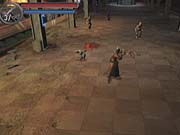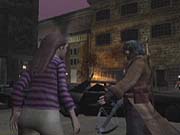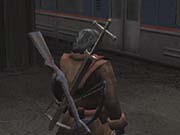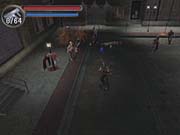There seem to be certain formulas for gameplay that, regardless of how often they're reused, are still incredibly appealing and satisfying. Simply put, Hunter: The Reckoning--which is based on the White Wolf pen-and-paper game of the same name--is a perfect example of the "throw as many monsters at you as possible" brand of gameplay that's proved successful in classic games like Gauntlet, Smash TV, and Diablo, albeit with a few new elements to take advantage of the license. Hunter does have a few relatively minor problems that crop up over the course of the game, but the game succeeds in delivering a very fun though short gaming experience, whether you're playing alone or with up to three friends.

Because of its ties to a pen-and-paper RPG, the story in Hunter: The Reckoning is more involving than in most games of this type, but there are certainly moments when you'll be scratching your head and wondering what exactly just happened. The game begins at the Ashcroft prison where a man is executed by the electric chair. But unbeknownst to the prison's inhabitants, the execution opens up a rift that allows spirits, trapped in the prison, to run amok and possess any bodies within the immediate area. Fortunately, four characters with the ability to see these demons fend off the attack and seal the prison, preventing the demons from spreading to the local town. A few years later, however, a rave is held at the prison to celebrate the execution, and this opens the rift, setting the demons loose on the town. The same four characters, known simply as hunters, return to finish the job they started. The story then takes a few twists and turns from there.
The four hunters--the avenger, the martyr, the defender, and the judge--are not unlike the different character types from games like Gauntlet, because each one is proficient in a particular skill, and each has a default set of weapons and an "edge," the game's name for magic spells. The avenger, who sports the gruff outward appearance of a motorcycle gang member, is the strongest of the four characters and has a shotgun and a massive ax as his standard weapons. His first edge gives extra strength to his ax. The young martyr is the fastest, and her attacks (which consist of dual pistols or knives) are also the quickest. Unsurprisingly, her first magic ability gives her an even greater boost in speed. The judge, who also happens to be a priest, wields a massive cruciform sword and a flimsy crossbow, but he makes up for his relatively weak melee skills with a devastating edge that can take out multiple enemies at once with a single strike. Lastly, the defender is perhaps the most balanced of the four characters with her mixture of speed and power. She has a pretty strong pistol and sword as her default weapons, and she's the only character that has a healing spell. There's an RPG element in Hunter: The Reckoning that lets your hunter increase his or her ratings in several different statistics (such as strength and accuracy) over the course of the game, though never to the point where his or her basic strengths and weaknesses will change.

When you're playing through the game for the first time, it's quite difficult to appreciate how different these characters really are. In fact, it's easy to think that they are nearly identical except for their magic attacks, but this isn't the case at all--you'll quickly find that not using each hunter's strengths to your advantage will usually result in a quick death.
The four hunters in Hunter: The Reckoning are balanced quite well when it comes to their individual strengths and weaknesses, because the way you play the game is dictated by the differences in their attributes. Since the avenger is the strongest and the best melee fighter, he has the luxury of being able to run to the center of a room filled with creatures where he can take them out at close range. While you will come across additional long-range weapons such as machine guns and rocket launchers, the avenger's default weapons are not meant for long range, so you almost always have to adopt this strategy. Conversely, the defender can hold her own at close range with the sword, but she's much more useful as a sniper-type character, picking off zombies and other nasty creatures from a distance.
The judge and the martyr are interesting characters because while they're useful in the single-player mode, they seem to be a little better suited to the multiplayer mode in Hunter. The judge isn't particularly skilled at long or close range, but he can do fairly well in either role. However, he's best used as an initial strike character, since he can move in and clear crowds of enemies with his magic skills so that other hunters can move in and finish the job. Likewise, the martyr plays like the perfect diversionary character, one that can move around a large area and draw the attention of enemies or move in behind an enemy for the kill when the enemy's focused on another hunter.

As mentioned, it's quite helpful to be aware of the various hunters' skills in the single-player mode, but it's absolutely crucial to work as a team in the multiplayer mode--almost to a fault. The multiplayer mode in Hunter can be quite fun, and you'll have to communicate with your teammates and adopt a strategy based on however many characters are in the game. However, the camera in the multiplayer mode has a restricted view so that individual players can't wander too far off from the rest of the group. This system can become a problem during some of the more hectic battles or during boss fights when you're trying to move but can't because the camera is restricting your movement. The last boss battle is particularly worthy of note because even when it looks like you're close to the other team members, the invisible barrier kicks in unexpectedly. This isn't necessarily a problem if you keep up good communications with your teammates, but even so, it can be frustrating during some of the later battles.
The controls in Hunter: The Reckoning can be a little cumbersome at first because the right analog stick essentially functions as the aiming mechanism. In addition, all attacks are performed using the right trigger button, which makes it somewhat difficult to perform repeated attacks with a hunter's melee weapon. But for long-range weapon purposes it works well, and as the game progresses, the melee weapons become less important, so the rapid trigger tapping will be less frequent. The fact that the different types of weapons and magic skills are mapped to different face buttons is very helpful, as it prevents you from having to cycle through a laundry list of available attack options.
Hunter is a visually impressive game. The environments are dark and gothic, but there's still a surprising amount of detail. In one of the earlier levels, you'll see burned-out cars, streets that have been ripped apart, mannequins behind store windows that actually shatter, and other details. The sewer levels use an excellent water effect similar to the one found in Baldur's Gate: Dark Alliance, as well as a reflective metal effect that looks good. There are some dull levels, such as the hospital, but you spend a relatively small amount of time in them. The character models for the hunters and nearly all of the boss characters are also done very well. Even the models for the zombies are pretty detailed, especially when you consider that there can be around a dozen of them onscreen at once with very little slowdown in the frame rate, if any. The lighting in the game is subdued and not all that noteworthy, which is unfortunate since some more lighting effects could have added to the atmosphere of the game.

The music in Hunter: The Reckoning is dynamic--it changes depending on the situation. If you're just walking through a level with no enemies in sight, then there either won't be any music or the music will be quiet and slower paced. However, if you jump into a room filled with enemies, the music will pick up with guitar riffs and other tracks befitting of the subject matter. None of the music sounds all that inspired, but it gets the job done. Perhaps the biggest surprise in Hunter is the voice acting. With the exception of one or two of the hunters, each character in the game gives a very good performance, especially a tortured soul named Carpenter whom you will meet sporadically throughout the game. However, there are times when the dialogue can get a little overdramatic.
Hunter: The Reckoning is definitely a fun game, but it's also a short one. It shouldn't take you more than five hours to go from beginning to end. Unfortunately, there isn't much in the way of extras except for an alternate hunter mode, which gives you alternate costumes for the hunters, and a nightmare mode, which makes the game even more difficult. There's some inherent replay value to be found in trying to play through the game using different hunters (or different combinations of hunters), but that's about it. So if you're willing to look past the lack of substantial replay value, and if you're looking for a quick dose of single-player or multiplayer mayhem, then you'll definitely want to check out Hunter: The Reckoning.